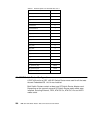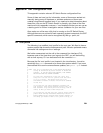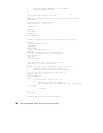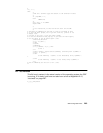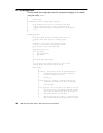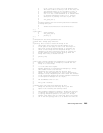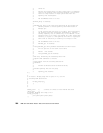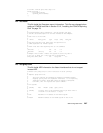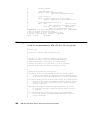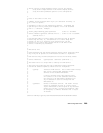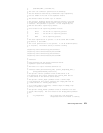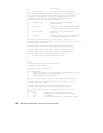GRF Configuration Files 265
# to be a lead or at least low in the spanning tree.
# The closer a LAN is to being a leaf in the tree, the
# less through traffic it will be asked to carry. A
# LAN would be a candidate for having a large path
# cost if it has a lower bandwidth ot if someone wants
# to minimize unnecessary traffic on it. A better
# description is possibly link cost or port cost.
#
# root_path_cost 5;
#
# Forward packets with the following destination addresses
# through this port.
#
# forward 00:a0:24:2a:50:e6 00:a0:24:2a:50:e7;
#
# };
# port gf041 {
# state blocking;
# root_path_cost 6;
# priority 5;
# };
#
# Configuration and tuning parameters that
# govern how a bridge group functions.
#
# priority: This is used to create the bridge ID for
# this bridge. this along with the MAC address of one
# of the ports in the group is used to set the bridge ID.
# This value allows the network manager to influence the
# choice of root bridge and the designated bridge. It is
# appended as the most significant portion of a bridge ID.
# A lower numerical value for bridge priority makes the
# bridge more likely to become the root.
#
# priority 128;
#
#
# hello_time: Interval between the transmission of configuration
# BPDUs by a bridge that is attempting to become the root
# bridge or is root bridge.
#
# It is the timer that elapses
# between generation of configuration messages by a bridge
# that assumes itself to be the root.
# Shortening this time will make the protocol more
# robust, in case the probability of loss of configuration
# messages is high. Lengthening the timer lowers the overhead
# of the alogorithm (because the interval between transmission
# of configuration messages will be larger).
#
# The recommended time is 2 sec.
#
# hello_time 2 seconds;
#
# forward_delay: The time value advertised by this
# bridge for deciding the time delay that a port must
# spend in the listening and learning states.
#
# This parameter temporarily prevents a bridge from starting
# to forward data packets to and from a link until news of
# a topology change has spread to all parts of a bridged
# network. This shousl give all links that need to be turned
# off in the new topology time to do so before new links are




